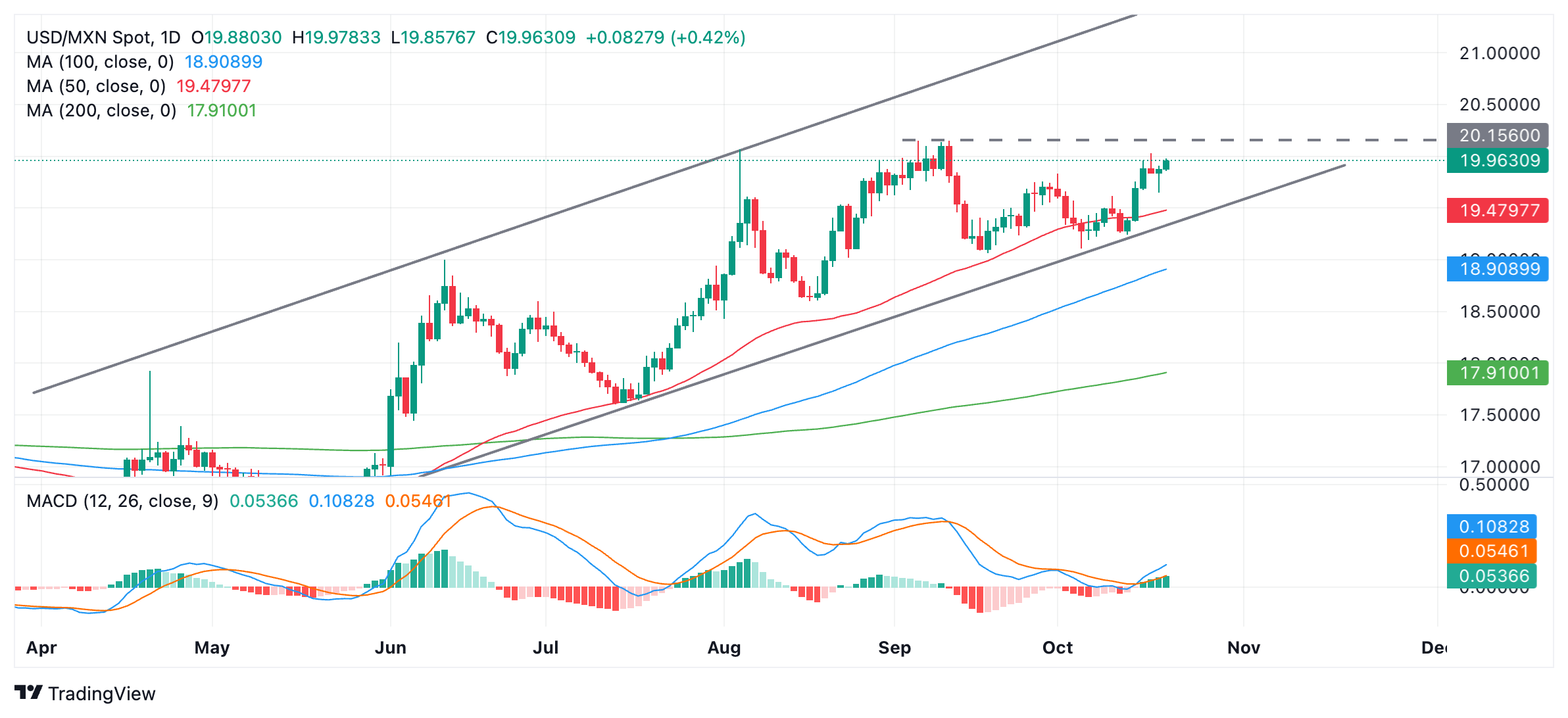Mexican Peso declines after Donald Trump edges ahead in polls
- The Mexican Peso is losing ground as Donald Trump edges past Kamala Harris in the polls.
- Trump has vowed to slap massive import tariffs on Mexican goods, especially cars, so if he wins, it will negatively impact MXN.
- USD/MXN starts rallying back up within its rising channel after a brief pullback.
The Mexican Peso (MXN) is weakening in its key pairs on Monday as the odds shift marginally in favor of former President Donald Trump winning the United States (US) presidential election in November. This comes after a period in which Trump trailed behind US Vice President and Democratic candidate Kamala Harris in the polls. Trump has said he will tear up the US’s free trade agreement with Mexico and slap up to 300% tariffs on Mexican cars arriving in the States. Such a move would hit the Mexican economy and reduce demand for its currency.
The latest national opinion poll by TIPP Insights on October 17-19 shows Donald Trump in the lead with 49% of the vote against Harris’s 47%, according to election website FiveThirtyEight. Betting website OddsChecker, meanwhile, has about equal chances – 33/50 or 60.02% for Trump to win and 4/6 or 60.00% for a Harris victory.
Trump supporter and CEO of Tesla Elon Musk’s pledge to offer voters in swing states the opportunity to be entered into a prize draw for a $1 million jackpot if they vote for Trump has also been seen as a major boost to the former president’s campaign, according to Bloomberg News.
Mexican Peso capped by defensive stance
The Mexican Peso might also be suffering as a result of the increasingly “defensive” stance of global investors towards emerging market (EM) assets, according to an article in El Financiero. This is partly because of increasing concerns the Federal Reserve (Fed) may have acted too hastily in lowering US interest rates by a double-the-usual 50 basis points (bps) (0.50%) at its meeting in September.
Buoyant US data suggests conditions may not have warranted such a large rate cut. Although a strong US economy is positive for Mexico because the US is such an important trading neighbor, elevated US interest rates also reduce the attractiveness of EM – chiefly Brazilian and Mexican – assets, according to The Wall Street Journal (WSJ). A retrenchment to a tighter stance would hurt demand for Mexican assets from global investors.
Disappointment at the level of Chinese stimulus measures might also be a factor in increasing investor defensiveness over EM holdings, which in turn could be weighing on the Mexican Peso. That said, the People’s Bank of China (PBoC) decided to cut its one- and five-year prime rates on Monday in a further measure to ease credit conditions.
Technical Analysis: USD/MXN starts rising again
USD/MXN restarts its rally within a rising channel after a brief pullback that ended up petering out pretty rapidly.
On Friday, the pair formed a bullish Hammer Japanese candlestick pattern, which neutralized the bearish Shooting Star candlestick formed the day before. This suggests there probably now will not be a pullback unfolding lower.
The pair is again on the rise at the start of the week and appears to be resuming its uptrend.
USD/MXN Daily Chart
The break above 19.83 (October 1 high) confirmed a continuation up to the next target in the vicinity of the September 10 high at 20.13, which remains live.
The Moving Average Convergence Divergence (MACD) momentum indicator is rising quite strongly after bottoming out at the zero line, supporting a mildly bullish outlook overall.
Interest rates FAQs
Interest rates are charged by financial institutions on loans to borrowers and are paid as interest to savers and depositors. They are influenced by base lending rates, which are set by central banks in response to changes in the economy. Central banks normally have a mandate to ensure price stability, which in most cases means targeting a core inflation rate of around 2%. If inflation falls below target the central bank may cut base lending rates, with a view to stimulating lending and boosting the economy. If inflation rises substantially above 2% it normally results in the central bank raising base lending rates in an attempt to lower inflation.
Higher interest rates generally help strengthen a country’s currency as they make it a more attractive place for global investors to park their money.
Higher interest rates overall weigh on the price of Gold because they increase the opportunity cost of holding Gold instead of investing in an interest-bearing asset or placing cash in the bank. If interest rates are high that usually pushes up the price of the US Dollar (USD), and since Gold is priced in Dollars, this has the effect of lowering the price of Gold.
The Fed funds rate is the overnight rate at which US banks lend to each other. It is the oft-quoted headline rate set by the Federal Reserve at its FOMC meetings. It is set as a range, for example 4.75%-5.00%, though the upper limit (in that case 5.00%) is the quoted figure. Market expectations for future Fed funds rate are tracked by the CME FedWatch tool, which shapes how many financial markets behave in anticipation of future Federal Reserve monetary policy decisions.
